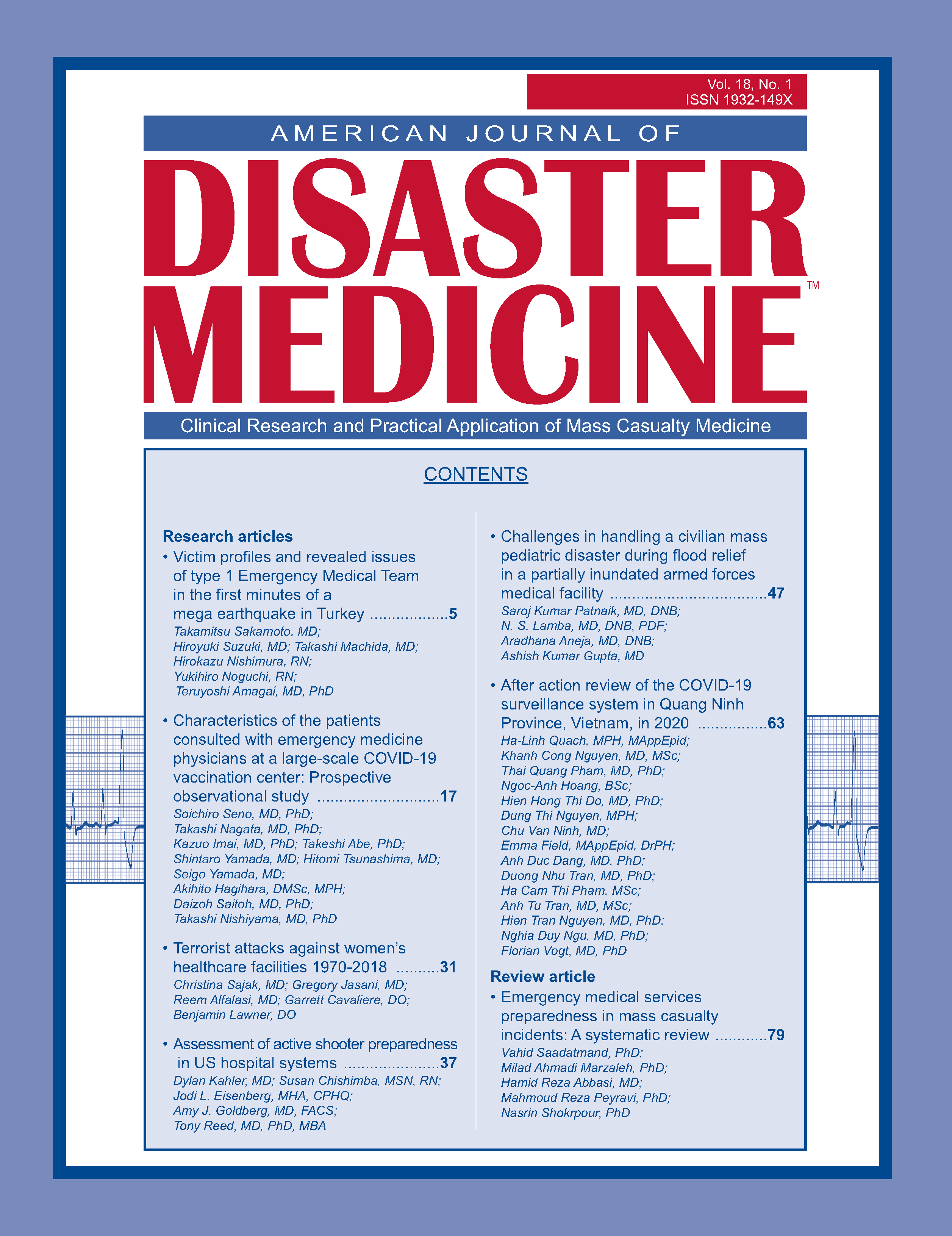Terrorist attacks against women’s healthcare facilities 1970-2018
DOI:
https://doi.org/10.5055/ajdm.0457Keywords:
women’s healthcare security, terrorism, disaster medicineAbstract
Introduction: Targeted acts of violence against women’s healthcare facilities and healthcare providers are a continued threat to the safety and well-being of those seeking reproductive care as well as those who provide it around the world.
Study objectives: This study aims to review and analyze terrorist attacks against facilities and providers who offer women’s healthcare services globally.
Methods: A thorough analysis of data coming from the Global Terrorism Database (GTD) was performed. This database is run by the National Consortium for the Study of Terrorism and Responses to Terrorism.
Results: Two hundred and seventy-one incidents registered in the GTD between 1970 and 2018 were found to be terrorist attacks on women’s healthcare facilities, the majority of which occurred in the United States. The method of attack or weapons used varied greatly. While the majority of these attacks targeted facilities, a number of attacks focused on individuals, namely, healthcare providers.
Conclusion: Facilities and providers associated with women’s healthcare services, particularly reproductive health, remain at risk of terror attack. Although carried out by a variety of groups and with diverse methods, these attacks appear most prevalent, or most reported, in Western society and threaten essential reproductive healthcare.
References
Council on Foreign Relations: Legal, safe, and affordable: Think global health. Available at https://www.thinkglobalhealth.org/article/legal-safe-and-affordable. Accessed November 16, 2022.
Planned parenthood 2020-2021 annual report: Planned parenthood.Available at https://www.plannedparenthood.org/uploads/filer_public/40/8f/408fc2ad-c8c2-48da-ad87-be5cc257d370/211214-ppfa-annualreport-20-21-c3-digital.pdf. Accessed December 1, 2022.
Kortsmit K, Mandel MG, Reeves JA, et al.: Abortion surveillance—United States, 2019. MMWR Surveill Summ. 2021; 70(No. SS-9): 1-29. DOI: 10.15585/mmwr.ss7009a1.
Paprzycka E, Dec-Pietrowska J, Lech M: The limits of compromise: The range of perspectives on women’s reproductive rights in Poland. Eur J Contracept Reprod Health Care. 2019; 24(2): 117-123. DOI: 10.1080/13625187.2019.1569223.
US Federal Bureau of Investigation: Strategic intelligence assessment and data on domestic terrorism. Available at https://www.dhs.gov/sites/default/files/2022-10/22_1025_strategic-intelligence-assessment-data-domestic-terrorism.pdf. Accessed July 2, 2021.
NARAL California: Anti-abortion violence. Available at https://prochoicecalifornia.org/issues/anti-abortion-violence/. Accessed April 12, 2023.
University of Maryland: National consortium for the study of terrorism and response to terrorism (START). Global terrorism database. Available at https://www.start.umd.edu/gtd. Accessed July 1, 2021.
DeCauwer H, Somville F, Sabbe M, et al.: Hospitals: Soft target for terrorism? Prehosp Disaster Med. 2017; 32(1): 94-100.
Emergency Services Sector: Cybersecurity and infrastructure security agency CISA. Available at https://www.cisa.gov/emergency-services-sector. Accessed December 1, 2022.
Shah I, Ahman E: Unsafe abortion: Global and regional incidence, trends, consequences, and challenges. J Obstet Gynaecol Can. 2009; 31(12): 1149-1158.
Cavaliere GA, Alfalasi R, Jasani GN, et al.: Terrorist attacks against healthcare facilities: A review. Health Secur. 2021; 19(5): 546-550.
McNeilly B, Jasani G, Cavaliere G, et al.: The rising threat of terrorist attacks against hospitals. Prehosp Disaster Med. 2022; 37(2): 223-229.
Published
How to Cite
Issue
Section
License
Copyright 2007-2025, Weston Medical Publishing, LLC and American Journal of Disaster Medicine. All Rights Reserved.


